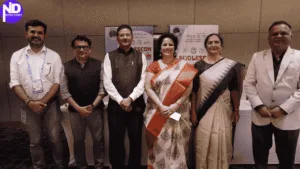Last updated on September 28th, 2025 at 05:55 pm
Adolescent Health: Gujarat’s Big Step Forward 2025
Newzdaddy Health And Fitness Updates
Adolescent healthcare often includes preventive care, mental health services, and sexual and reproductive education. Studies show early interventions in adolescence reduce adult health problems like obesity, depression and chronic disease. Health systems are increasingly recognising adolescent health as its own field, not just “child” or “adult” care.

The Gujarat Adolescent Health Academy (AHA) will host the grand “ADOLESCON 2025” National Conference from September 19 to 21, 2025, at Crowne Plaza, S.G. Highway, Ahmedabad. This event forms an important part of the Silver Jubilee celebrations of the Adolescent Health Academy (AHA). A Silver Jubilee means 25 years, so this marks 25 years of AHA’s work. Over that time, adolescent health in India has seen new policies (Adolescent Health Programme, part of National Health Mission), more awareness of mental health, nutrition, and sexual health. Holding the event in Ahmedabad, which has good medical institutions, helps reach many practitioners.
Set against the backdrop of Ahmedabad , a city known for its heritage and progress, “ADOLESCON 2025” will be jointly organised by Gujarat AHA, AOP Ahmedabad, and AOP Gujarat. The conference promises a treasure trove of scientific knowledge along with a unique experience of Gujarati hospitality. Sharing details about the event were Dr Himabindu Singh (Chairperson, AHA India), Dr Sushma Desai (Organising Chairperson, ADOLESCON 2025), Dr Nishchal Bhatt (Organising Chairperson, ADOLESCON 2025 and Chairperson, Gujarat AHA), and Dr Samir Shah (Chief Organising Secretary).
The Academy of Paediatrics (AOP) in Gujarat and Ahmedabad are branches of the Indian Academy of Paediatrics (IAP). The AHA is the adolescent health arm of the IAP. Their collaboration shows paediatricians are taking adolescent health seriously, across both state and national levels. Leadership by people like Dr Himabindu Singh and Dr Nishchal Bhatt shows that this is a well-supported effort. Adolescents are the powerhouse of human potential. Investing in their health and well-being yields lifelong returns and contributes to building a healthier and stronger nation. This year, the conference theme is “Mpower YUVA – Accelerated Action for the Health of Adolescents (AAHA!!)” which emphasises the vital role of paediatricians in adolescent healthcare. The sessions are designed by paediatricians, for paediatricians, helping them integrate adolescent healthcare into their daily practice with ease.
Themes like “accelerated action” reflect global pushes (e.g., WHO’s adolescent health strategies). Youth empowerment (“YUVA”) is part of India’s approach: empowering adolescents with knowledge and resources improves outcomes. Paediatricians are often the first point of contact for adolescent health issues; training them better leads to earlier detection of issues like mental health or early‐onset diabetes.
Over three days, the conference will address a wide range of sensitive adolescent issues, including mental health concerns, substance abuse, digital wellness, career and exam stress, peer pressure, bullying, body image, and related challenges. There will also be dedicated sessions on girls’ health, such as menstrual health and hygiene, PCOS, and teenage pregnancy; critical topics like HPV and cancer prevention, non-communicable diseases, dengue prevention; a special UNICEF-led session; as well as discussions on counselling, sports medicine, and life skills. Interactive youth-centred events like Youth Quiz Showdown and Youth Unfiltered will provide a direct connection with young participants.
Mental health is now one of the top adolescent health priorities in the WHO India strategy. Topics like PCOS and teenage pregnancy are rising in public health focus in India. HPV vaccination is being promoted to prevent cervical cancer, but awareness is still low in many parts. Life skills, including coping with peer pressure, digital pressures and stress, are increasingly included in school health programmes. UNICEF usually supports adolescent health through programmes like “Adolescent Girls’ Health” and “Life Skills Education.”
As part of ADOLESCON 2025, an outreach program was conducted across schools and colleges in Gujarat from September 13 to 19. These programs engaged students, parents, and teachers with awareness sessions focusing on healthy lifestyle (diet, exercise, sleep), immunisation awareness, mental health (stress, exam pressure, anxiety, bullying), social media use and its impact, life skills, and family life education. Outreach in schools is key to early health literacy. Diet, exercise and sleep are foundations for physical and mental health; poor sleep among adolescents is linked to depression and poor performance. Social media use is a growing issue: cyberbullying, sleep disturbance, and self-image concerns. Family life education helps mitigate misunderstandings about puberty.
The three-day conference will bring together eminent experts, paediatricians, and healthcare leaders from across India. Through scientific sessions, research paper presentations, poster presentations, and workshops, the conference will explore multiple dimensions of adolescent health. Scientific sessions and workshops give doctors evidence-based updates. Poster presentations allow young researchers to share findings. Workshops help with skills (e.g. counselling, sports medicine). National leaders in adolescent health might share policy updates, best practices, and outcomes. This kind of sharing helps standardise care across India and reduce gaps in rural vs urban health outcomes.
Must Read:
Bavishi Eye Hospital Marks 60 Years Of Care And Trust
Community Health And Nutrition Gains With Anganwadi Centres Drive